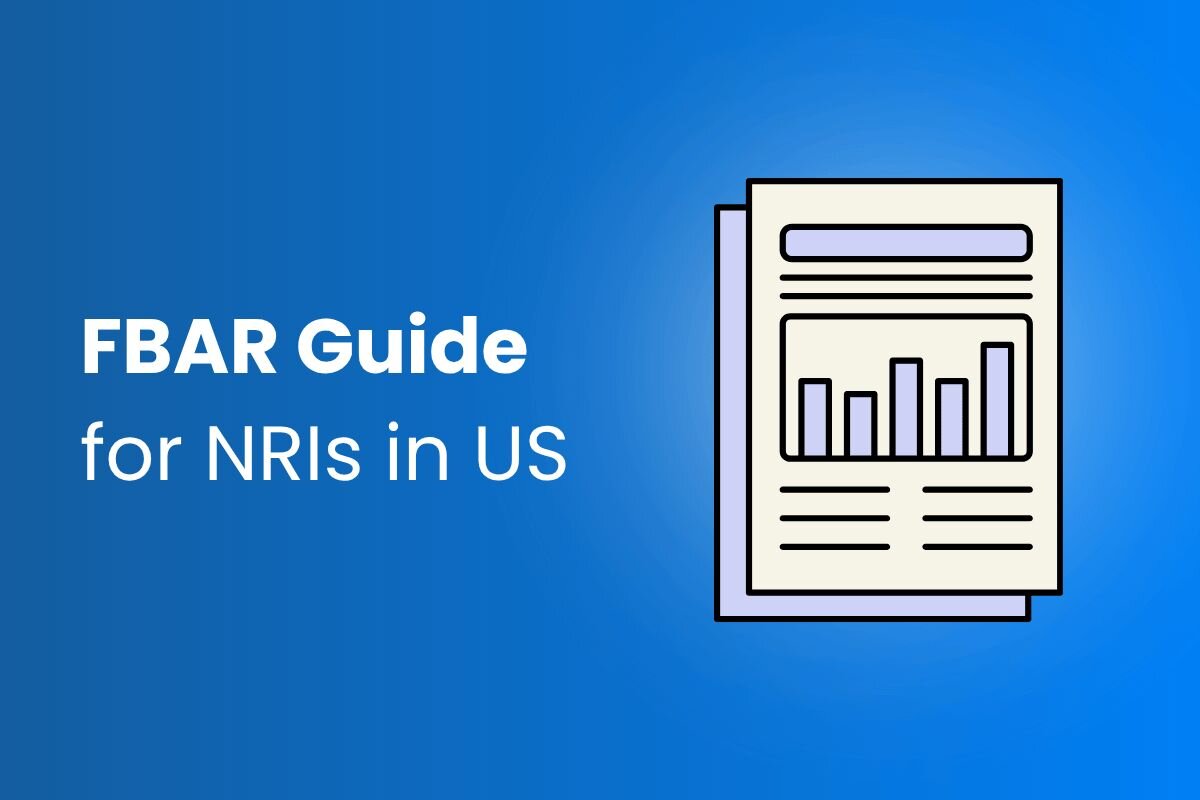You've been in the US for a few years now. You're filing your taxes diligently every April. Your NRE account back in India has your savings, maybe some fixed deposits, a few mutual funds. You think you're doing everything right.
Then someone mentions FBAR. You've never heard of it. You Google it and panic sets in.
"Was I supposed to be filing this all along?"
Here's the reality: thousands of NRIs discover FBAR years after they should have started filing. The penalties can reach $16,536 per year for honest mistakes, or even 50% of your account balance if the IRS believes you deliberately hid accounts. But here's the good news: if you understand the rules and act now, you can stay compliant and avoid these penalties entirely.
This guide explains everything you need to know about FBAR as an NRI.
Key Takeaway
- FBAR (Foreign Bank and Financial Accounts Report) is mandatory if your Indian accounts exceed $10,000 combined at any point during the year
- You report the maximum balance during the year, not the December 31 balance
- Filing is completely free and takes 30-45 minutes once you have your information ready
- Deadline is April 15 with automatic extension to October 15
- Penalties range from $16,536 for non-willful violations to 50% of account balance for willful violations
- If you missed previous years, amnesty programs exist to help you catch up with reduced or zero penalties
- FBAR is separate from your tax return and doesn't create tax liability by itself
What is FBAR and Why You Need to Know About It
FBAR stands for Foreign Bank and Financial Accounts Report. The official form is FinCEN Form 114, and you file it with the Financial Crimes Enforcement Network (FinCEN), not the IRS.
Here's what confuses most NRIs: FBAR is not a tax form. You're not paying any taxes through FBAR. It's an information report that tells the US government about your financial accounts outside the United States.
The requirement comes from the Bank Secrecy Act of 1970, designed to prevent money laundering and tax evasion. After 9/11, enforcement became significantly stricter.
Why NRIs miss this requirement:
Your CPA might not ask about foreign accounts. Standard tax software doesn't always flag it clearly. Your NRE account interest is tax-free, so you assume there's nothing to report. But FBAR isn't about taxes, it's about disclosure.
Even if your Indian accounts don't generate taxable income, you must file FBAR if you cross the $10,000 threshold.
Who Must File FBAR?
You must file FBAR if you meet both conditions:
- You're a "US person" under IRS rules
- Your foreign accounts exceeded $10,000 combined at any point during the year
Are You a US Person?
US Citizens: If you have a US passport, you must file FBAR regardless of where you live. This includes Indians who became naturalized US citizens.
Green Card Holders: From the moment you get your Green Card, you're considered a US person. Your physical location doesn't matter.
Substantial Presence Test: This catches most visa holders. You meet this test if you were physically present in the US for:
- At least 31 days in the current year, AND
- At least 183 days calculated over three years using this formula:
- All days in the current year
- Plus 1/3 of days from the prior year
- Plus 1/6 of days from the year before that
Example: You're on an H1B visa. In 2024, you were in the US for 320 days. In 2023, you were here for 280 days. In 2022, you were here for 240 days.
Calculation: 320 + (280÷3) + (240÷6) = 320 + 93 + 40 = 453 days
You meet the substantial presence test. If your Indian accounts exceeded $10,000 at any point in 2024, you must file FBAR.
Most H1B and L1 visa holders meet this test after their first full year in the US. F-1 students have exemptions for their first five calendar years, but once you switch to H1B, the clock starts.
Understanding the $10,000 Threshold
The $10,000 threshold is where most mistakes happen. It's based on the aggregate maximum value of ALL your foreign accounts at any single point during the calendar year.
Not the year-end balance. Not the average. The highest combined total at any moment.
How It Works
Priya has three accounts in India:
- NRE Savings: peaked at ₹6 lakhs in March ($7,200)
- NRO Fixed Deposit: peaked at ₹5 lakhs in August ($6,000)
- Mutual Fund: peaked at ₹3 lakhs in November ($3,600)
By December 31, she had withdrawn most funds. Her year-end total was only $2,400.
Does Priya need to file FBAR? Yes, absolutely. Her aggregate maximum is $7,200 + $6,000 + $3,600 = $16,800. Even though her December 31 balance was only $2,400, she crossed the threshold during the year.
The Accounts Don't Peak Simultaneously
You take the highest balance from each account throughout the entire year and add them up. Your accounts don't need to hit their maximum on the same day.
Amit's NRE account peaked at $6,500 in February. His NRO account peaked at $4,800 in September. His accounts never exceeded $10,000 combined on any single day. But his aggregate maximum is $11,300. He must file FBAR.
Even One Day Above $10,000 Triggers Filing
If your aggregate maximum hits $10,001 for even a single day, you must file FBAR for that entire year. There's no grace period, no rounding, no minimum duration.
Converting Rupees to Dollars
You must convert balances to US dollars using the US Treasury's exchange rate for December 31 of the reporting year.
Example: Your NRO account peaked at ₹12 lakhs on August 15, 2024. The INR/USD rate on December 31, 2024 is 83.50.
Calculation: 1,200,000 ÷ 83.50 = $14,371
You always use the December 31 rate, even if your account peaked in March. Find official rates at Treasury Reporting Rates of Exchange.
How to File FBAR: Step-by-Step Process
Filing FBAR is free and takes 30-45 minutes once you have your information ready. Here's exactly what to do.
Step 1: Gather Your Information
For each account, you need:
- Bank name and complete address
- Account number
- Account type (savings, FD, securities, etc.)
- Maximum balance during the year (in USD)
For yourself:
- Social Security Number or ITIN
- Date of birth
- Current US address
Pro tip: Download statements for the entire year (January 1 to December 31) for all accounts. Create a simple spreadsheet to track the maximum balance for each account.
Step 2: Convert to US Dollars
For each account:
- Find the highest balance during the year (review all monthly statements)
- Go to the Treasury exchange rate website
- Find the December 31 exchange rate for that year
- Divide your rupee amount by the exchange rate
- Round to the nearest dollar
Step 3: Access the BSA E-Filing System
Go to: https://bsaefiling.fincen.treas.gov/main.html
Don't search for "IRS FBAR" because FBAR isn't filed with the IRS.
Select "File FinCEN Form 114 individually" under "No Registration FBAR Filer." You don't need to create an account.
Step 4: Fill Out the Form
Part I - Your Information:
- Name (as on SSN), SSN, date of birth
- Filer type: Individual
- Your US address
Part II - Account Information (repeat for each account):
- Account type (bank, securities, other)
- Financial institution name: "State Bank of India" or "ICICI Bank Limited"
- Institution address (branch address or main office)
- Account number
- Maximum value in USD
- Ownership type (individual, joint, signature authority only)
Part III - Certification:
- Check the box certifying accuracy
- System generates electronic signature automatically
Step 5: Submit and Save Confirmation
After submitting, you'll receive a BSA Identifier Number. This is critical.
Screenshot or print this confirmation immediately. It's your proof of timely filing. Store it with your tax records for at least 6 years.
Step 6: Keep Records
Maintain for 5 years:
- Bank statements showing maximum balances
- Currency conversion calculations
- Copy of filed FBAR
- BSA confirmation number
Organization tip: Create a folder "FBAR 2024" and store everything together.
Which Indian Accounts Must You Report?
The general rule: if it's a financial account at an Indian institution where you have financial interest or signature authority, report it when your aggregate exceeds $10,000.
Bank Accounts (Always Report These)
NRE Accounts (Non-Resident External): Must be reported. Many NRIs think these are exempt because the interest is tax-free both in India and the US under the tax treaty. That doesn't matter for FBAR. These are foreign accounts and must be disclosed.
NRO Accounts (Non-Resident Ordinary): Fully reportable without exception. These hold your rupee income from India like rental income, pension, interest, or dividends.
All deposit types count:
- Regular savings accounts
- Fixed deposits (both NRE and NRO)
- Recurring deposits
- Current accounts
- Sweep accounts where excess savings automatically move to FDs
The account type or tax treatment doesn't change the FBAR reporting requirement.
Investment Accounts
Mutual Funds:
The reporting depends on how you hold them:
Scenario 1: You hold 15 mutual funds in your Zerodha demat account. You report the demat account number and the total value of all 15 funds combined.
Scenario 2: You bought 5 mutual funds directly from AMCs (HDFC Equity Fund, ICICI Bluechip Fund, SBI Small Cap Fund, etc.). You report each of the 5 funds separately with their individual account numbers.
Demat and Trading Accounts: Report the account number and total value of all securities held (stocks, bonds, ETFs). If your demat had ₹25 lakhs in January but dropped to ₹18 lakhs by December, you report ₹25 lakhs (converted to dollars) as the maximum value.
Insurance and Retirement Accounts
Life Insurance:
ULIPs (Unit Linked Insurance Plans): Must be reported because they have cash surrender value. Check your annual statement for the "investment value" or "cash surrender value." That's what you report.
Term Insurance: NOT reportable. Pure protection policies with no cash value don't need to be disclosed.
Retirement Accounts (The Gray Areas):
PPF (Public Provident Fund): This is the most controversial account for NRIs. Arguments against reporting: funds are locked for 15 years, withdrawals are heavily restricted, it's a government retirement scheme. Arguments for reporting: you can take loans after year 6, partial withdrawals after year 7.
Conservative approach: If you've taken any loans or withdrawals, report it. If it's completely untouched, many tax professionals say it's not reportable. Consult a CPA for your specific situation.
EPF (Employee Provident Fund): Generally not reportable because it's a mandatory retirement account with access restrictions. However, if you've made voluntary contributions or taken loans, the waters get murky.
NPS (National Pension System): Similar to EPF. Most tax professionals say it's not reportable, but the IRS hasn't provided crystal clear guidance.
Read more about NPS for NRIs
When in doubt, report it. The penalty for over-reporting is zero. The penalty for under-reporting can be substantial.
Special Account Types
Gold Bonds: Sovereign Gold Bonds held in your demat account are reportable as part of your demat account value. Physical gold, jewelry, and gold coins are NOT reportable.
Cryptocurrency: If you hold crypto on Indian exchanges like WazirX or CoinDCX, this is a gray area. Many tax professionals recommend reporting these accounts to be safe. Crypto in private wallets (where you control the private keys) is generally not reportable.
What You DON'T Report
Real Estate: Your apartment in Mumbai or plot in Bangalore is not reportable on FBAR, even if it's worth crores. Real estate is not a financial account.
Physical Assets: Gold jewelry, art, antiques, cars, and other tangible assets are not reportable.
US-Based Accounts: Your Charles Schwab account that invests in Indian stocks or ADRs is NOT reportable because Schwab is a US institution. The location of the financial institution matters, not where it invests.
Joint Accounts and Signature Authority
This is where many NRIs get tripped up.
Joint with Spouse (both US persons):
Option 1: File one joint FBAR. Both spouses complete and sign Form 114a (Record of Authorization). One spouse files the FBAR for all jointly owned accounts. Keep Form 114a with your records for 5 years (you don't submit it).
Option 2: File separately. Each spouse reports the full value of joint accounts, not split 50/50.
Example: You and your wife have a joint NRE account with $60,000. If filing separately, you both report $60,000 on your individual FBARs.
Joint with Non-US Spouse:
You must file individually and report the full value of joint accounts. You cannot file jointly when one spouse is not a US person.
Example: You're a Green Card holder. Your wife is an Indian citizen in Mumbai. Your joint NRO account has $45,000. You report the full $45,000 on your FBAR. Your wife has no FBAR requirement.
Joint with Parents (The Big Surprise):
Your parents added you as a joint holder on their Indian account for convenience. Maybe they wanted you to handle emergencies or make transfers when needed.
The rule: You must report the full value of that account, even though the money is 100% theirs.
Real scenario: Your father's NRO savings account has ₹50 lakhs ($60,000). He adds you as joint holder. You've never taken a single rupee from it. You must still report the full $60,000 on your FBAR.
This catches thousands of NRIs completely off guard. If you're a joint holder on your parents' account, your mother's account, and a sibling's account, you report all three at their full values.
Signature Authority on Business Accounts:
If you have signing authority over your family business accounts in India, you must report them even if you own 0% of the business.
Exception: If you're an employee of a large US company and have signature authority over company accounts solely due to your job (and you have zero financial interest), you might be exempt if the company files its own FBAR. This exception is narrow and doesn't apply to family businesses or companies where you have ownership.
FBAR Filing Deadlines
Primary deadline: April 15 of the year following the reporting year
Automatic extension: October 15 (you don't need to request it)
For your 2024 accounts, you file by April 15, 2025, or October 15, 2025 if you need extra time.
Unlike tax returns, there's no penalty for using the extension. October 15 is treated as the actual deadline. This gives you six extra months to gather Indian bank statements.
FBAR Penalties: What Happens If You Don't File
FBAR penalties are among the harshest in the US tax code. Understanding them helps you grasp why compliance is so critical.
Non-Willful Violations (Honest Mistakes)
If you didn't know about FBAR or made an honest mistake: penalty up to $16,536 per year (adjusted for inflation annually).
What counts as non-willful:
- You genuinely didn't know about the FBAR requirement
- Your CPA didn't tell you about it
- You reasonably couldn't have been expected to know
- You made an honest reporting error
Example: Meera lived in the US for six years, filing tax returns correctly every year. Nobody told her about FBAR. She maintained her NRE account in India with about $45,000. When she discovered FBAR in 2024, she immediately filed delinquent returns for six previous years. Her violation was non-willful.
The IRS often reduces or waives non-willful penalties for first-time filers who use the amnesty programs, especially when there's no tax due on the unreported income.
Willful Violations (Deliberate Non-Compliance)
If the IRS determines you knew about the requirement and deliberately didn't file: penalty is the greater of $165,353 or 50% of account balance per violation per year.
What counts as willful:
- You knew about FBAR and intentionally didn't file
- You checked "yes" on Schedule B (which asks about foreign accounts) but didn't file FBAR
- You received IRS notices about foreign accounts and ignored them
- You deliberately hid accounts from your tax preparer
The 50% penalty can wipe out your entire account balance in just two years if applied to multiple years.
Example: Vikram knew about FBAR (his CPA mentioned it multiple times) but deliberately didn't file for five years while maintaining $500,000 in Indian accounts. This is willful. The maximum penalty could reach $250,000 per year (50% of $500,000) for five years, totaling over $1 million.
Criminal Penalties (Extreme Cases)
For severe willful violations: fines up to $250,000 and up to 5 years in prison.
These are reserved for true tax evaders involved in money laundering, fraud, or other serious crimes. The average NRI who simply forgot to file won't face criminal charges. Criminal prosecution is rare and targets egregious cases.
How the IRS Discovers Unreported Accounts
FATCA Data Exchange: India and the US exchange financial information automatically. Indian banks report accounts held by US persons directly to the IRS every year. This includes:
- Your name and US taxpayer identification number
- Account balances and values
- Interest, dividends, and other income
If the IRS receives information from your Indian bank but you haven't filed FBAR, red flags go up immediately.
Schedule B Cross-Check: When you file your tax return, Schedule B asks: "At any time during the year, did you have a financial interest in or signature authority over a financial account in a foreign country?" If you check "yes" but don't file FBAR, the IRS's systems flag the discrepancy.
Audit Discovery: During regular tax audits, IRS agents often ask about foreign accounts. Lying to an IRS agent compounds the problem significantly.
The Reality of Enforcement
The IRS has significantly increased FBAR enforcement over the past decade. According to recent data, FinCEN receives over 1.2 million FBARs annually, but many US persons with foreign accounts still don't file.
The IRS uses sophisticated data analytics to identify non-filers. With automatic information exchange under FATCA, it's becoming nearly impossible to hide foreign accounts.
Bottom line: The cost of non-compliance far exceeds the 30 minutes it takes to file FBAR correctly.
What If You Missed Filing FBAR in Previous Years?
If you just discovered you should have been filing FBAR for the past several years, take a deep breath. You're not alone, and the IRS provides multiple programs specifically designed to help people like you get compliant.
The worst thing you can do is ignore the problem. The second worst thing is to just start filing going forward without addressing past years (called a "quiet disclosure").
Here are your options:
Delinquent FBAR Submission Procedures (Best for Simple Cases)
Who qualifies:
- Your violations were non-willful (you genuinely didn't know)
- You're not currently under IRS audit or investigation
- The IRS hasn't already contacted you about missing FBARs
- Your tax returns are otherwise up to date
How it works:
- File all missing FBARs through the BSA E-Filing system (you can file for past years)
- Include a statement explaining why you didn't file on time ("I was unaware of the FBAR requirement until now")
- If you have reasonable cause, there are often zero penalties
Example: Deepak worked in California on an H1B for seven years. He maintained an NRE account and two fixed deposits in India totaling about $75,000. He filed his tax returns correctly every year but never heard of FBAR. His CPA didn't ask about foreign accounts.
In 2024, a colleague mentioned FBAR. Deepak immediately researched and realized he should have been filing. He used the Delinquent FBAR Procedures, filed seven years of FBARs with an explanation, and received no penalties because his violation was clearly non-willful and there was no tax due.
Best for: NRIs who have been filing tax returns correctly but simply didn't know about FBAR.
Streamlined Filing Compliance Procedures (For Cases with Unreported Income)
If you not only missed FBAR but also failed to report foreign income on your tax returns, this program is designed for you.
Streamlined Domestic Offshore Procedures (for US residents):
Requirements:
- You must certify that your failure was non-willful
- You weren't living abroad for at least 330 days in any of the past 3 years
- You're not under examination or criminal investigation
What you file:
- Amend or file last 3 years of tax returns (Forms 1040)
- File last 6 years of FBARs
- Pay any taxes owed (with interest)
- Pay a 5% penalty on the highest aggregate balance (December 31 value) across all 6 years
The 5% penalty calculation:
Review the December 31 balance of all your foreign accounts for the past 6 years. Find the year with the highest combined December 31 balance. Pay 5% of that amount.
Example: Ravi had failed to report interest income from his Indian accounts. His maximum December 31 balance over 6 years was $180,000 (in 2020). His Streamlined penalty: 5% of $180,000 = $9,000.
This $9,000 replaces potentially hundreds of thousands in FBAR penalties. Without this program, Ravi could have faced up to $16,536 per year for 6 years ($99,216) plus additional penalties for unreported income.
Streamlined Foreign Offshore Procedures (for expats abroad):
Same as above, except:
- You must have lived outside the US for at least 330 days in one of the past 3 years
- Zero penalty (no 5% charge)
This is designed for US citizens or Green Card holders who moved abroad and didn't realize they still had US filing requirements.
Voluntary Disclosure Practice (For Willful Violations)
If your non-compliance was willful (you knew about FBAR and intentionally didn't file), or if you're facing potential criminal liability, the Voluntary Disclosure Practice may be your only option.
This requires working with an experienced tax attorney. The IRS won't prosecute you criminally if you come forward voluntarily, but you'll pay significant civil penalties.
Don't attempt this without professional legal representation.
Why You Should Never Do a "Quiet Disclosure"
A quiet disclosure means you start filing FBARs and corrected tax returns for current years without formally addressing the past through one of the IRS programs.
Why this is dangerous:
- The IRS has sophisticated systems that flag when someone suddenly starts filing FBARs after years of not filing
- It looks like you're trying to hide something
- The IRS often responds with audits and maximum penalties
- You lose access to the penalty relief programs
The IRS has explicitly warned taxpayers against quiet disclosures. If caught, they may assume your violations were willful and impose the harshest penalties.
How to Decide Which Program to Use
Use Delinquent FBAR Procedures if:
- You've been filing tax returns correctly
- You just didn't know about FBAR
- All your foreign income was reported on tax returns
- Your accounts are relatively simple (personal savings, FDs)
Use Streamlined Procedures if:
- You failed to report foreign income on tax returns
- You have investment income (interest, dividends, capital gains) that wasn't reported
- Your situation is more complex
- You want penalty protection through the formal program
Consult a tax attorney if:
- Your violations might be considered willful
- You have very large unreported amounts
- You're facing potential criminal issues
- You've already been contacted by the IRS
Take Action Now
The longer you wait, the worse it gets. Interest accumulates on unpaid taxes. The IRS's data systems are constantly improving. Indian banks are reporting your accounts right now under FATCA.
Don't let fear paralyze you into inaction. The amnesty programs exist specifically to help people in your situation. Use them.
FBAR vs FATCA: What's the Difference?
Many NRIs confuse FBAR with FATCA (Form 8938). They're two separate requirements with different thresholds.
Most NRIs file FBAR but not Form 8938 because FBAR has a much lower threshold. You could have $30,000 in Indian accounts and need to file FBAR but not Form 8938.
However, check both requirements annually. They're not mutually exclusive.
Common FBAR Mistakes NRIs Make
Using year-end balance instead of maximum balance: You must report the highest balance during the entire year, not December 31.
Forgetting closed accounts: If you closed an account in April but it had $15,000 in February, you still report it.
Not reporting fixed deposits: People remember savings accounts but forget FDs.
Missing joint accounts with parents: Your mother's account where you're a joint holder must be reported at full value.
Assuming NRE accounts are exempt: Many people think NRE accounts don't count because interest is tax-free. Wrong. You still report them.
Not converting currency correctly: Always use December 31 Treasury exchange rate, not the rate when the account peaked.
When Should You Hire a Tax Professional?
You can file yourself if:
- You have a few straightforward accounts
- Clear ownership (all individual accounts)
- You haven't missed previous years
- Combined accounts are under $100,000
Hire a CPA or Enrolled Agent if:
- You have many accounts (10+)
- You missed filing for multiple previous years
- You have signature authority on business or family accounts
- You deal with trusts or complex ownership
- Your accounts exceed $500,000
- You're unsure which accounts to report
A specialized tax professional costs $300-$800 for FBAR filing but prevents $16,000+ penalties. Look for CPAs with NRI or international tax experience who file dozens of FBARs annually.
| Feature | FBAR | FATCA (Form 8938) |
|---|---|---|
| Filed With | FinCEN | IRS (with tax return) |
| Threshold (Single, US resident) | $10,000 aggregate | $50,000 year end or $75,000 anytime |
| Threshold (Married jointly, US resident) | $10,000 aggregate | $100,000 year end or $150,000 anytime |
| What's Reported | Only financial accounts | Accounts + other foreign assets |
| Must file even without tax return? | Yes | No |
The Bottom Line
FBAR is mandatory if you're a US person with more than $10,000 in foreign accounts at any point during the year. The filing is free, takes 30-45 minutes, and must be done separately from your tax return by April 15 (automatic extension to October 15).
Thousands of NRIs discover FBAR years too late. Now that you know about it, you can stay compliant and avoid penalties that can reach $16,536 per year or even 50% of your account balance.
Action steps:
- Calculate your aggregate maximum for 2024 (add up peak balances from all Indian accounts)
- If it exceeds $10,000, mark April 15, 2025 on your calendar
- Gather your bank statements now
- File through the BSA E-Filing system
- Keep your confirmation number
If you missed previous years, don't ignore it. Use the Delinquent FBAR Procedures or Streamlined Compliance to catch up with reduced penalties.
The key is action, not fear.
Frequently Asked Questions
Do I need to file FBAR if all my money is in NRE accounts?
Yes. NRE accounts are foreign financial accounts and must be included in your FBAR calculation, even though the interest is tax-free.
What if I only had $11,000 in India for one week?
If your combined foreign accounts exceeded $10,000 for even one day, you must file FBAR for that entire year.
Can I file FBAR myself or do I need a CPA?
You can file yourself if your situation is simple. Hire a CPA if you have many accounts, missed previous years, or have complex ownership situations.
What exchange rate should I use for converting rupees?
Use the US Treasury's exchange rate for December 31 of the year you're reporting, regardless of when your account peaked.
Do I report my PPF account on FBAR?
This is a gray area. If your PPF is completely untouched and locked, many tax professionals say it's not reportable. If you've taken loans or partial withdrawals, report it to be safe. Consult a tax advisor for your specific situation.
What if I have a joint account with my non-US spouse?
You must report the full value of the joint account on your individual FBAR. You cannot file jointly when one spouse is not a US person.
Can I get penalized even if I didn't know about FBAR?
Yes, but penalties for non-willful violations (honest mistakes) are lower. The penalty is up to $16,536 per year. Amnesty programs often reduce or eliminate these penalties for first-time filers.
How far back do I need to file if I missed previous years?
The Delinquent FBAR Submission Procedures require filing all years you should have filed. The Streamlined procedures require six years of FBARs. Don't ignore past years, use the amnesty programs.
What's the difference between FBAR and Form 8938?
FBAR goes to FinCEN with a $10,000 threshold. Form 8938 goes to the IRS with your tax return and has much higher thresholds (starting at $50,000). Most NRIs file FBAR but not Form 8938.
Do I need to file FBAR if I'm returning to India permanently?
If you give up your Green Card or no longer meet the substantial presence test, you don't need to file for subsequent years. But you must file for all years when you were a US person.
About the Author

By Prakash
CEO & Founder of InvestMates
Prakash is the CEO & Founder of InvestMates, a digital wealth management platform built for the global Indian community. With leadership experience at Microsoft, HCL, and Accenture across multiple countries, he witnessed firsthand challenges of managing cross-border wealth. Drawing from his expertise in engineering, product management, and business leadership, Prakash founded InvestMates to democratize financial planning and make professional wealth management accessible, affordable, and transparent for every global Indian.




